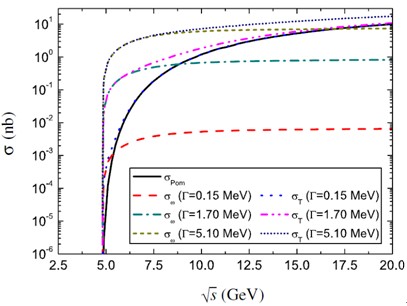Researchers at Institute of Modern Physics, Chinese Academy of Sciences (IMP) explored the discovery potential of the X(3915) in meson photoproduction process, which is a different production mechanism in studying the X(3915) and P-wave charmonium. It’s helpful to further study of X(3915). The X(3915) is a typical charmoniumlike state, which was first observed in the  invariant mass spectrum of invariant mass spectrum of  . Since X(3915) could be produced in the . Since X(3915) could be produced in the  fusion process, its possible spin-parity assignment is either Jp=0+ or Jp=2+ . Later, BABAR carried out a spin-parity analysis of X(3915), which supported the Jp=0+assignment due to the fusion process, its possible spin-parity assignment is either Jp=0+ or Jp=2+ . Later, BABAR carried out a spin-parity analysis of X(3915), which supported the Jp=0+assignment due to the  resonance. resonance. The X(3915) as a  state brings a new problem. A state brings a new problem. A  state dominantly decays into state dominantly decays into  . Until now the X(3915) signal has been missing in the . Until now the X(3915) signal has been missing in the  invariant mass spectrum given by Belle and BABAR in invariant mass spectrum given by Belle and BABAR in  . Some research proposed that the Z(3930) enhancement may contain two P-wave higher charmonia . Some research proposed that the Z(3930) enhancement may contain two P-wave higher charmonia  and and  . The numerical result shows that this assumption is supported by the analysis of the . The numerical result shows that this assumption is supported by the analysis of the  invariant mass spectrum. Thus, there is no difficulty in this invariant mass spectrum. Thus, there is no difficulty in this  explanation of X(3915). However, the inner structure of X(3915) is still unknown. It is obvious that the production of X(3915) in different processes other than the explanation of X(3915). However, the inner structure of X(3915) is still unknown. It is obvious that the production of X(3915) in different processes other than the  fusion is an interesting research topic. fusion is an interesting research topic. Researchers explored the production of the charmoniumlike state X(3915) in the photoproduction process  . The numerical result indicated that the maximum of the calculated total cross section of . The numerical result indicated that the maximum of the calculated total cross section of  could reach up to the order of 10nb. could reach up to the order of 10nb. Furthermore, the Dalitz plot analysis was performed by considering the Pomeron exchange as the background contribution. This analysis showed that the X(3915) signal could be distinguished from the background easily and the best energy window of searching for X(3915) is  or or  with different decay width 1.7 MeV or 5.1 MeV, which is the important information for further experimental study of X(3915) by meson photoproduction. with different decay width 1.7 MeV or 5.1 MeV, which is the important information for further experimental study of X(3915) by meson photoproduction. The work has been published in Phys. Rev. D.89, 034016 (2014). 
Fig. 1 The energy dependence of the total cross sections for  (Image by IMP) (Image by IMP) |

